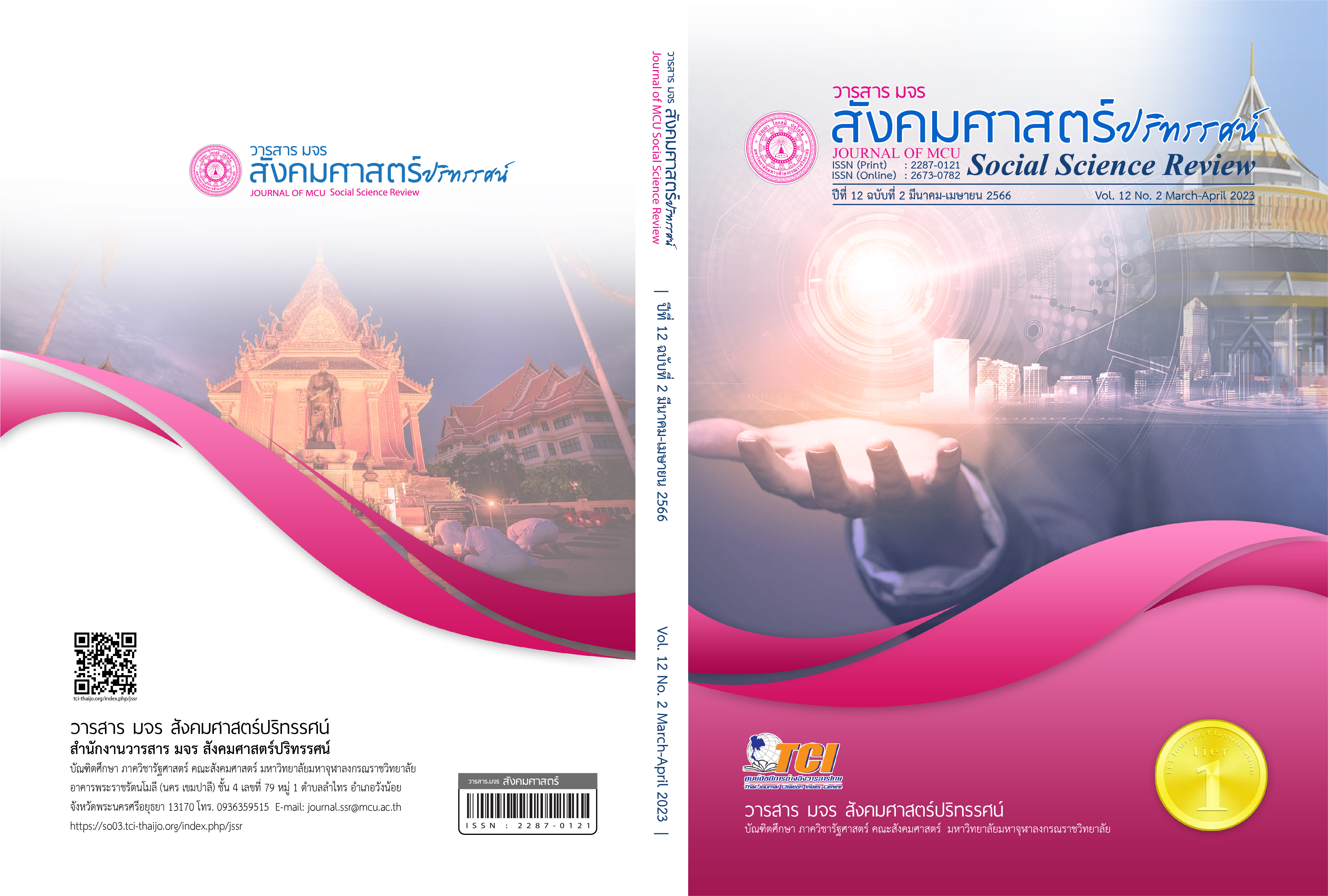การพัฒนาตัวแบบเชิงสาเหตุของภาวะผู้นำที่ส่งผลต่อความยั่งยืนของอุตสาหกรรมพื้นฐานและการเหมืองแร่ของประเทศไทย
คำสำคัญ:
ภาวะผู้นำ, ความรับผิดชอบต่อสังคม, อุตสาหกรรมพื้นฐานและการเหมืองแร่บทคัดย่อ
บทความวิจัยนี้มีวัตถุประสงค์เพื่อวิเคราะห์องค์ประกอบเชิงยืนยัน ศึกษาอิทธิพลทางตรง อิทธิพลทางอ้อม และอิทธิพลโดยรวมของตัวแปรด้านภาวะผู้นำที่มีความรับผิดชอบต่อสังคม ด้านประสิทธิภาพห่วงโซ่คุณค่าเพื่อสังคม ด้านคุณค่าทางเศรษฐกิจที่จับต้องไม่ได้ และพัฒนาตัวแบบความสัมพันธ์เชิงสาเหตุของตัวแปร ที่มีอิทธิพลต่อผลการดำเนินงานขององค์กรที่ยั่งยืน โดยการวิจัยแบบผสมผสาน กลุ่มตัวอย่างที่ศึกษาจำนวน 209 ราย เป็นผู้ประกอบการในกลุ่มอุตสาหกรรมพื้นฐานและการเหมืองแร่ของประเทศไทย เก็บรวบรวมข้อมูลด้วยแบบสอบถาม เก็บข้อมูลเชิงคุณภาพจากการสัมภาษณ์เชิงลึกจำนวน 5 ราย นำข้อมูลมาสังเคราะห์ร่วมกับข้อมูลเชิงปริมาณเพื่อตอบสมมติฐาน สถิติที่ใช้ในการทดสอบสมมติฐานใช้ตัวแบบสมการโครงสร้างในการวิเคราะห์หาความสัมพันธ์ของตัวแปร
ผลการวิจัยพบว่า การตรวจสอบความสอดคล้องกลมกลืนกับข้อมูลเชิงประจักษ์ โดยมีค่าความกลมกลืนผ่านเกณฑ์ และการทดสอบสมมติฐานการวิจัยพบว่า ภาวะผู้นำที่มีความรับผิดชอบต่อสังคม ส่งผลทางตรงเชิงบวกต่อผลการดำเนินงานขององค์กรที่ยั่งยืน โดยมีประสิทธิภาพห่วงโซ่คุณค่าเพื่อสังคม คุณค่าทางเศรษฐกิจที่จับต้องไม่ได้ ส่งผลทางอ้อม และสัมภาษณ์ผู้บริหารพบว่า ภาวะผู้นำที่มีความรับผิดชอบต่อสังคมจะมุ่งเน้นการเปลี่ยนแปลงขององค์กรด้วยความรับผิดชอบต่อสังคมไปในทิศทางที่สามารถแข่งขันได้ มุ่งหวังให้เกิดคุณค่าร่วมขององค์กรและสังคมเพื่อการพัฒนาองค์กรที่ยั่งยืน
เอกสารอ้างอิง
กรมอุตสาหกรรมพื้นฐานและการเหมืองแร่. (2563) สรุปผลการดำเนินงาน CSR-DPIM 2563. กรุงเทพฯ: กรมอุตสาหกรรมพื้นฐานและการเหมืองแร่.
กองบริหารสิ่งแวดล้อม กรมอุตสาหกรรมพื้นฐานและการเหมืองแร่. (2563) คู่มือมาตรฐานเหมืองแร่สีเขียว (พิมพ์ครั้งที่ 3). กรุงเทพฯ: กองบริหารสิ่งแวดล้อม
สำนักงานสภาพัฒนาการเศรษฐกิจและสังคมแห่งชาติ. (2564) เป้าหมายการพัฒนาที่ยั่งยืน. สืบค้น 25 สิงหาคม 2564, จาก https://sdgs.nesdc.go.th
สำนักโรคจากการประกอบอาชีพและสิ่งแวดล้อม. (2559) คู่มือการเฝ้าระวังดูแลสุขภาพประชาชนรอบเหมืองทองคำ. สืบค้น 20 กันยายน 2564, จาก http://envocc.ddc.moph.go.th/
Dooley, P. (2015). An Empirical Development of Critical Value Factors for System Quality and Information Quality in Business Intelligence Systems Implementations.
Elkington, J. (2007). Enter the Triple Bottom Line. In the Triple Bottom Line: Does it all add up? 1-16. Edited by Henriques, A. and J. Richardson. London: Earthscan.
Gardberg, N. A., & Fombrun, C. J. (2006). Corporate citizenship: Creating intangible assets across institutional environments. Academy of management Review, 31(2), 329-346.
Hair, J. F., Black, W. C., Babin, B. J., Anderson, R. E., & Tatham, R. L. (2006). Multivariate data analysis (6th Edition). NJ: Pearson Prentice Hall.
Hsu, K. T. (2012). The advertising effects of corporate social responsibility on corporate reputation and brand equity: Evidence from the life insurance industry in Taiwan. Journal of business ethics, 109(2), 189-201.
Jones, R. (2005). Finding sources of brand value: Developing a stakeholder model of brand equity. Journal of brand management, 13(1), 10-32.
Karna, J., Hansen, E., & Juslin, H. (2003). Social responsibility in environmental marketing planning. European journal of marketing. 37(5/6), 848-871.
Karp, T. (2003). Socially responsible leadership. foresight. 5(2),15-23.
Kline, R. B. (2015). Principles and practice of structural equation modeling. New York: Guilford publications.
Kramer, M. R., & Porter, M. (2011). Creating shared value. Harvard business review, (Vol. 17). FSG. Harvard business review, 17.
McWilliams, A., Siegel, D.S. & Wright, P.M. (2006). Corporate social responsibility: Strategic implications. Journal of management studies, 43(1),1-18.
Miles, M. B., & Huberman, A. M. (1994). Qualitative data analysis: An expanded sourcebook. sage.
Perez, A. (2015). Corporate reputation and CSR reporting to stakeholders: Gaps in the literature and future lines of research. Corporate communications: An international journal. 20(1), 11-29.
Porter, M.E. & Kramer, M.R. (2006). The link between competitive advantage and corporate social responsibility. Harvard business review, 84(12), 78-92.
Schumacker, R. E., & Lomax, R. G. (2004). A beginner's guide to structural equation modeling. New Jersey: Lawrence Erlbaum Associates.
Srisuphaolarn, P. (2013). From altruistic to strategic CSR: how social value affected CSR development–a case study of Thailand. Social ResponsibilityJournal. 9(1), 56-75.
Sthapitanonda, P. & Watson, T. (2015). The impact of culture upon Thai CSR concepts and practice: a study of relationships between NGOs and corporations. Asia Pacific Public Relations Journal, 16(1), 61-72.
ดาวน์โหลด
เผยแพร่แล้ว
รูปแบบการอ้างอิง
ฉบับ
ประเภทบทความ
สัญญาอนุญาต
ลิขสิทธิ์ (c) 2023 วารสาร มจร สังคมศาสตร์ปริทรรศน์

อนุญาตภายใต้เงื่อนไข Creative Commons Attribution-NonCommercial-NoDerivatives 4.0 International License.
เพื่อให้เป็นไปตามกฎหมายลิขสิทธิ์ ผู้นิพนธ์ทุกท่านต้องลงลายมือชื่อในแบบฟอร์มใบมอบลิขสิทธิ์บทความให้แก่วารสารฯ พร้อมกับบทความต้นฉบับที่ได้แก้ไขครั้งสุดท้าย นอกจากนี้ ผู้นิพนธ์ทุกท่านต้องยืนยันว่าบทความต้นฉบับที่ส่งมาตีพิมพ์นั้น ได้ส่งมาตีพิมพ์เฉพาะในวารสาร มจร สังคมศาสตร์ปริทรรศน์ เพียงแห่งเดียวเท่านั้น หากมีการใช้ภาพหรือตารางหรือเนื้อหาอื่นๆ ของผู้นิพนธ์อื่นที่ปรากฏในสิ่งตีพิมพ์อื่นมาแล้ว ผู้นิพนธ์ต้องขออนุญาตเจ้าของลิขสิทธิ์ก่อน พร้อมทั้งแสดงหนังสือที่ได้รับการยินยอมต่อบรรณาธิการ ก่อนที่บทความจะได้รับการตีพิมพ์ หากไม่เป็นไปตามข้อกำหนดเบื้องต้น ทางวารสารจะถอดบทความของท่านออกโดยไม่มีข้อยกเว้นใดๆ ทั้งสิ้น





